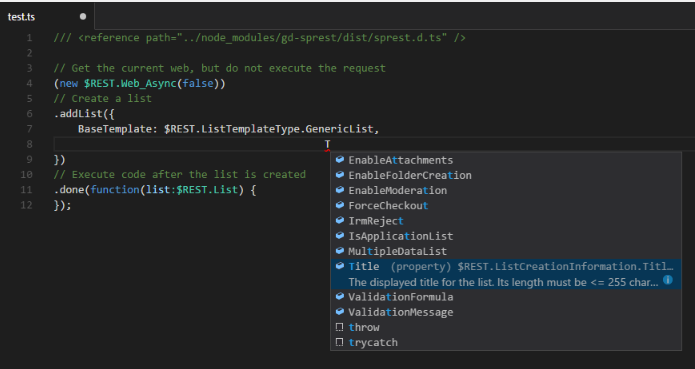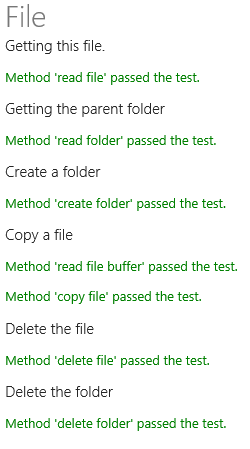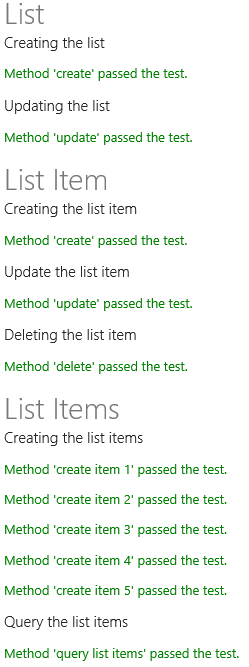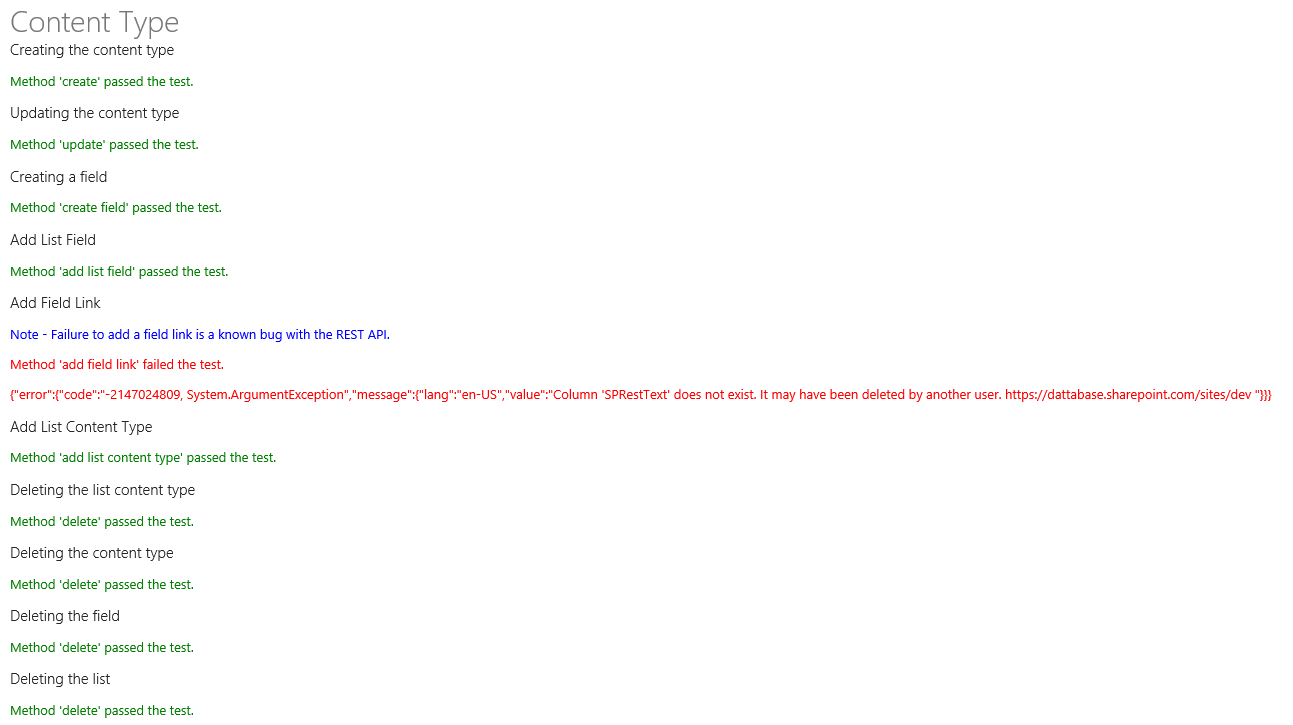SharePoint 2013/Online REST Library
An easy way to develop against the SharePoint REST api.
Please report issues. I am constantly updating/fixing/testing to make this library better.
Benefits:
- Generates the REST api url and formats it for app webs automatically.
- Global flag to execute requests on creation, to reduce the number of calls to the server.
- Parent property for easier development.
- PowerShell-Like experience in the browser console. (Synchronous Requests)
- Switch between asynchronous and synchronous requests by the object's property.
- Written in TypeScript with definition file for intellisense.
Get Started:
Node Package Manager (NPM)
npm install gd-sprest --save-dev
TypeScript Definition (Intellisense)
I was finally able to put the definition file together, to ensure intellisense is available.

Example Projects
Bootstrap List
Note - This is still in dev
Documentation:
Executing Requests from the App Web
A global flag is used to determine if an app web request should execute requests against the host web. The host web will default to the SPHostUrl query string value.
Note - This value is false by default
$REST.DefaultRequestToHostWebFl = true;
Asynchronous/Synchronous requests
All availabe objects having an api entry point, will have the following constructors [Object] and [Object]_Async.
Examples
Asynchronous Request
// Get the current web
(new Web_Async())
// Execute the request
.execute(function(web) {
// Code to execute after the request completes
});
Synchronous Request
var web = (new $REST.Web()).execute();
Fewer Requests to the Server
Having the ability to chain the 'Properties', it allows for the developer to get the target object with one request to the server.
Example - Creating a List
Synchronously
// This will create the web object
var list = (new $REST.Web())
// Get the list collection
.Lists()
// Create a list
.add({
BaseTemplate: 100,
Description: "This is a test list.",
Title: "Test"
})
// Execute the request
.execute();
Asynchronously
// This will create the web object
(new $REST.Web_Async())
// Get the list collection
.Lists()
// Create the list
.add({
BaseTemplate: 100,
Description: "This is a test list.",
Title: "Test"
})
// Execute the request
.execute(function(list) {
// Additional code goes here
});
Example - Query a List
// Get the list
var items = (new $REST.List("[List Name]"))
// Query using OData
.query({
// OData properties - Refer to the OData section for additional details
})
// Execute the request
.execute();
// Example of getting items by a CAML Query
(new $REST.List("Site Assets"))
// Get the items by a CAML Query
.getItemsByQuery("<Query><Where><Gt><FieldRef Name='ID' /><Value Type='Integer'>0</Value></Gt></Where></Query>")
// Execute the request
.execute();
// Example of getting items by a CAML View Query
(new $REST.List("Site Assets"))
// Get the items by a CAML View Query
.getItems("<View Scope='RecursiveAll'><Query><Where><Eq><FieldRef Name='FileLeafRef' /><Value Type='File'>sprest.js</Value></Eq></Where></Query></View>")
// Execute the request
.execute();
Optional Input
All constructors take have the following optional parameters:
// The target information is optional
new Object([Object Specific Input Parameters], targetInfo);
Target Information
The target information consists of the following properties:
- asyncFl - Flag to determine if the request should executes asynchronously or synchronously.
- bufferFl - Flag to determine if the output of the request is a file stream.
- callback - Required for asynchronous request. Executed after execution.
- data - Template used for passing the method parameters in the body of the request.
- defaultToWebFl - Flag to determine if the url should default to the current web url, site url otherwise.
- method - The request method type.
- endpoint - The api endpoint.
- url - The server relative site/web url to execute the request against.
PowerShell-Like Experience
Since the library can be executed synchronously, the user can execute commands in the browser's console window and interact with the SharePoint site in a command-line interface.
Note - The commands will execute under the security of the current user.
Note - SharePoint online may reject synchronous requests. It's better to use asynchronous requests.
OData Queries
Each collection will have a generic "query" method with the input of the OData query operations. The oData object consists of the following properties:
- Expand - A collection of strings representing the field names to expand.
- Filter - A collection of strings representing the filters to apply.
- OrderBy - A collection of strings representing the fields to order by.
- QueryString - A read-only property representing the query string value of the oData object.
- Select - A collection of strings representing the field names to select.
- Skip - The number of objects to skip.
- Top - The maximum number of objects to return.
Query List Collection
// Get the current web's list collection
var list = (new $REST.List())
// Query for the 'Dev' list
.query({
Filter: ["Title eq 'Dev'"]
});
Query List Item Collection
// Get the 'Dev' list
(new $REST.List_Async("Dev"))
// Get the item collection
.Items()
// Query for my items, expanding the created by information
.query({
Select: ["Title", "Author/Id", "Author/Title"],
Expand: ["Author"],
Filter: ["AuthorId eq 11"]
})
// Execute the request
.execute(function(items) {
// Code goes here
});
Test:
I wrote a sample test file. To run it, upload the test folder contents to a SharePoint library and access to the "test.aspx" page. This will test the basic functionality of the library.
Refer to the test script file for detailed examples of using the library.
File/Folder

List/Item

Content Type/Field

Examples:
Note - The examples below will execute one request to the server.
Content Type
List
// Get the 'Document' content type in the 'Documents' library
var ct = (new $REST.List("Document"))
.ContentTypes()
.getByName("Documents")
.execute();
Web
// Get the 'Item' content type in the current web
var ct = (new $REST.Web())
.ContentTypes()
.getByName("Item")
.execute();
Content Types
List
// Get the content types in the 'Documents' library
var cts = (new $REST.List("documents"))
.ContentTypes()
.execute();
Web
// Get the content types in the current web
(new $REST.Web_Async())
.ContentTypes()
.execute(function(cts) {
// Additional code goes here
})
Field
List
var field = (new $REST.List("documents"))
.Fields("Title")
.execute();
Web
(new $REST.Web())
.Fields("Title")
.execute(function(field) {
// Additional code goes here
});
Fields
List
var fields = (new $REST.List("documents"))
.Fields()
.execute();
Web
(new $REST.Web())
.Fields()
.execute(function(fields) {
// Additional code goes here
});
File
List
Asynchronously
(new $REST.List_Async("Documents"))
.RootFolder()
.Folders("forms")
.Files("EditForm.aspx")
.execute(function(file) {
// Additional code goes here
})
Synchronously
var file = (new $REST.List("Documents"))
.RootFolder()
.Folders("forms")
.Files("editform.aspx")
execute();
Web
var file = (new $REST.Web())
.getFileByServerRelativeUrl("/sites/dev/shared documents/forms/editform.aspx")
.execute();
Files
List
var files = (new $REST.List("documents"))
.RootFolder()
.Files()
.execute();
Web
(new $REST.Web())
.Files()
.execute();
Folder
List
var folder = (new $REST.List("Documents"))
.RootFolder("Forms")
.execute()
Web
var folder = (new $REST.Web())
.getFolderByServerRelativeUrl("/sites/dev/shared documents/forms")
.execute();
Folders
List
var folders = (new $REST.List("documents"))
.Folders()
.execute();
Web
var folders = (new $REST.Web())
.Folders()
.execute();
List
var list = (new $REST.List("documents"))
.execute();
Lists
var lists = (new $REST.Web())
.Lists()
.execute();
List Item
var item = (new $REST.List("documents"))
.Items(1)
.execute();
List Items
All Items
var items = (new $REST.List("documents"))
.Items()
.execute();
CAML Query
(new $REST.List("documents"))
// Get the items
.getItemsByQuery("<Query><Where><Gt><FieldRef Name='ID' /><Value Type='Integer'>0</Value></Gt></Where></Query>")
// Execute after the request completes
.execute(function(items)) {
// Code goes here
}
Role Assignments
List
var roleAssignments = (new $REST.List("documents"))
.RoleAssignments()
.execute();
Web
var roleAssignments = (new $REST.Web())
.RoleAssignments()
.execute();
Role Definitions
var roleDefinitions = (new $REST.List("documents"))
.RoleDefinitions()
.execute();
Site
var site = (new $REST.Site()).execute();
Site Groups
var siteGroups = (new $REST.Web())
.SiteGroups()
.execute();
User Custom Actions
Site
var customActions = (new $REST.Site())
.UserCustomActions()
.execute();
Web
var customActions = (new $REST.Web())
.UserCustomActions()
.execute();
Users
var users = (new $REST.Web())
.Users()
.execute();
View
var view = (new $REST.List("dev"))
.Views()
.query({
Filter: ["Name eq 'All Items']
})
.execute();
Views
var views = (new $REST.List("documents"))
.Lists()
.execute();
Web
var web = (new $REST.Web()).execute();







